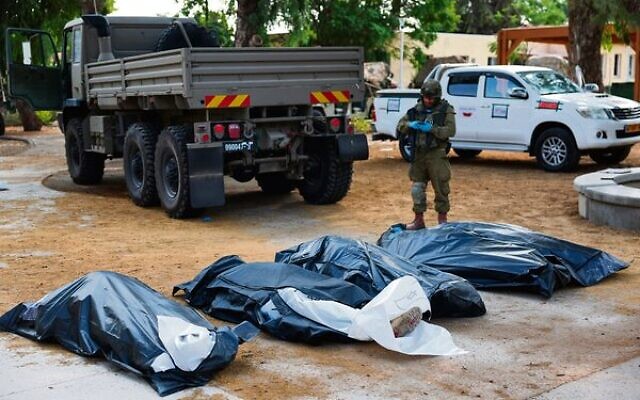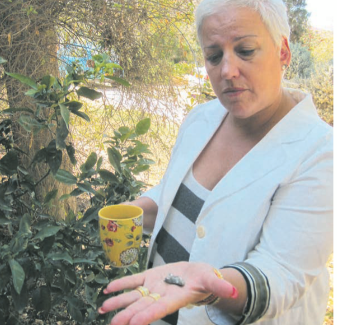The shattering of an idyllic peace
Ronit Fraid wrote the following after a 2013 trip to Israel. Ten years later, the events of October 7 have brought its relevance sharply into focus.

I carry back to Australia pieces of shrapnel from mortars fired from Gaza at a peaceful kibbutz in Israel called Kfar Aza.
The kibbutz is two-and-a-half kilometres from the border and one can clearly see the high-rise buildings of Gaza over the adjacent fields. Previously, these fields comprised orange groves. But terrorists used the trees for cover in their attempts to infiltrate the kibbutz, so they had to be cut down. The mortars exploded causing death and destruction. Our friends Yaron and Poly, who live on the kibbutz, as well as other kibbutz members, reported miracles that occurred when the mortars fell. Poly for one, was saved because when she was running to the safe room at the moment of impact, she was behind a separating wall … a second earlier or later she would have been struck by a mortar.
Miracles? The whole kibbutz is a miracle. And as so many of the places we visited near the border, the people who live there are extraordinarily warm, loving and friendly. They emanate a real purity of spirit. Every time I connect with these people, they are so open and welcoming, it’s like our very souls connect. I struggle for words to describe how it feels.

It takes special people to live in these places, to raise their babies and children, to remain positive and normal, and continue to work and live and contribute so meaningfully to the land they love. These people harbour no rage, anger or hatred. They simply want to live in peace with their neighbours. As Poly (who is a kindergarten teacher) told us, “We used to be friends with people in Gaza and they used to come here and we loved to visit them also … but sadly … it’s not to be … not for now anyway.”
Each of the kibbutz homes has a solid concrete safe room since the first and second Gaza wars. Well, really since Gaza was given to the Palestinians in exchange for peace, and when the Jewish population of Gaza was forcibly evicted by the Israeli government. Of course, it is on the public record that the Palestinians destroyed everything that the small Jewish population of Gush Katif and other settlements in Gaza had created, and then they turned their hatred against the men, women and children living over the border.
The newly built safe rooms let our people sleep a little more peacefully at night, but no one really knows what may happen in the next moment. Often there isn’t time from the commencement of firing from Gaza … not enough time to run for safety … not from the time the alarm sounds.
Our friend Yaron showed me some of the shrapnel which they had collected after rocket attacks. I placed a piece in the palm of my hand. It was sharp and heavy and I realised that even a sliver so small could, when propelled by explosion, cruelly destroy lives. And these mortars were maliciously aimed and fired at civilians, at a kindergarten full of children, girls and boys, at newborn infants, at their mothers and fathers and boobas and zaidas, at families … not at soldiers in a war zone … but at a kibbutz full of families, and their pets, dogs and birds, at gardens … full of flowers, at a place of peace and harmony. This place is also where children and others, traumatised by the shelling, often come from Sderot, for therapy and respite.
As a clinical psychologist, I was interested in which particular treatment modality was favoured for the PTSD symptoms they encountered. Poly simply said, “We surround the children with love, just more and more love, we just love them. And it works.”
Kfar Aza is a place where no one can take the next moment for granted, and for the time we were there … neither did we. Every moment we spent there felt like a blessing.
So back to the shrapnel and why I made such a strange request of our hosts. “Have you got any spare shrapnel I could keep?” And why I decided to bring it back to Australia with me.
Well, simply it was because of how it made me feel, how profoundly impactful it was to hold it in the palm of my hand. Feeling its weight helped me understand what a powerful impact an entire exploding mortar of this stuff would have, the uncompromising brutality of it, all of which I could feel viscerally just by holding it.
In that moment, I thought this sliver of a mortar could do more to convey the truth of the situation in Israel than a hundred written articles. If I could just get people to hold it, describe where it came from and who it was aimed at, then surely, people would understand the hatred behind the act, the violent desire to destroy, not to build but to kill, not to negotiate but to annihilate, and therefore understand that this is not about wanting the land, but about wanting the total destruction of a people, the Jewish people of the land of Israel.
This is the harsh reality we in the West must face in order to overcome, in order to protect all that we value in the world against the forces looking to destroy it. Israel is at the front line, all of Israel, all of the time, in every minute … but do not be mistaken. All of us are vulnerable to these dangers because those who threaten us do not respect any borders or value love, life and freedom as we do. We in the West would do well to understand and acknowledge the enemy we are up against.
Postscript: In these terrible times I am shattered to report that amid so much suffering and loss of life, our dear friend Poly from Kfar Aza, has lost her beloved and beautiful son Nadav (Z’L) leaving two more young children without a father.
Ronit Fraid is president of JNF Victoria.
Kfar Aza was the site of untold horrors during Hamas’s murderous October 7 rampage. Nearly 100 civilians were killed, including some 40 babies. Others were kidnapped into Gaza.

comments